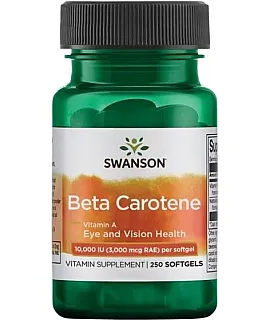Vitamin A
Vitamin A - the key to health and beauty. It is an indispensable substance, ensuring proper development, functioning of eyesight, as well as beautiful skin. This category is dedicated to this valuable vitamin, the symptoms of its deficiency and excess, as well as the role it plays in the body. In addition, we will look at how to properly supplement vitamin A to avoid potential risks. Read more
The role of vitamin A in the body
Vitamin A, also known as retinol, is crucial for many functions in our bodies. First and foremost, it is essential for the proper functioning of vision - it participates in the conversion of light into nerve signals in the retina. In addition, vitamin A has a number of important functions in maintaining the health of the skin, and protects against free radicals, so it exhibits antioxidant properties.
Vitamin A also supports immunity by participating in the production of white blood cells. It is important to consume it properly, especially by pregnant women, as deficiencies can lead to birth defects in the baby.
Therefore, our body needs a constantly maintained, sufficient level of vitamin A, which can be achieved both through diet and the use of supplements.
Sources of vitamin A
Vitamin A is found in animal and plant products. The richest sources are liver, fish, butter, and eggs. In the form of a provitamin, or beta-carotene, it is present primarily in red, yellow and orange colored vegetables and fruits - carrots, pumpkin, spinach or peppers. Beta-carotene, as a powerful antioxidant, also has protective properties for the skin.
However, it is worth remembering that the absorption of vitamin A depends on dietary fats, so it is recommended to consume it accompanied by a small amount of fat to increase its absorption.
For those who cannot consume enough vitamin A in the diet, it is possible to supplement levels through supplements. This is especially important in at-risk groups, such as vegetarians and vegans, who do not have access to animal sources of the vitamin.
Symptoms of vitamin A deficiency
Vitamin A deficiency can manifest itself in a number of ways and, unfortunately, is often overlooked. Early symptoms include dry skin, brittle hair and nails, and decreased twilight vision, known as dusk blindness. In a more advanced stage, deficiencies can lead to immune system dysfunction and greater susceptibility to infection.
Hypovitaminosis A can also affect vision health, leading to xerophthalmia, or corneal dryness, which in extreme cases can result in blindness. Children are particularly vulnerable to the effects of vitamin A deficiency, and it can affect their development and overall health.
For this reason, regular monitoring of vitamin A levels in the body is recommended, especially for those at risk of deficiency, such as children, the elderly and pregnant women.
Excess vitamin A
On the other hand, excess vitamin A can also be harmful. Hypervitaminosis A, a condition in which there is an excess of the vitamin, manifests itself in headaches, vomiting and even liver damage, among other symptoms. Excessive consumption of vitamin A can lead to hypertoxicity, especially when taken in the form of supplements without medical supervision.
People who consume large amounts of vitamin A-rich foods or abuse supplements should be aware of the risks and consult their eating habits with a doctor or nutritionist. This is especially important for pregnant women, as excess vitamin A can cause serious birth defects in the baby.
Regular testing of vitamin A levels can help to monitor it properly and avoid both deficiencies and excessive accumulation in the body.
Understanding the role vitamin A plays in our bodies, where to look for it and the risks associated with excess or deficiency is key to maintaining health on many levels. Remember to eat a balanced diet and, if necessary, consult your doctor about supplementation of this valuable vitamin.
Vitamin A supplementation
Vitamin A supplementation may be necessary in some cases, especially when it is difficult to meet its needs with diet for various reasons. This is especially important for people who have specific needs, such as pregnant women, the elderly, or people with certain medical conditions that can interfere with vitamin A absorption.
When choosing supplements, it is important to pay attention to the form of vitamin A. Retinol is more bioavailable and more easily absorbed by the body, but excess amounts can also be more toxic. On the other hand, beta-carotene as a precursor to vitamin A is less toxic, but its conversion to the active form of the vitamin in the body can vary depending on an individual's predisposition.
It is also worth keeping in mind the proper storage of vitamin A supplements, as improper conditions (such as too high a temperature or direct light exposure) can affect their effectiveness. By paying attention to these aspects, you can maximize the benefits of supplementation by ensuring that your body gets the right amount of this important vitamin.
Highlights of Vitamin A:
- Sources of vitamin A include animal and plant products, and supplements like retinol and beta-carotene.
- Symptoms of deficiency can be subtle or severe, including vision problems and greater susceptibility to infection.
- Too much vitamin A, especially in the form of supplements, can be toxic and lead to serious health problems.
- Consultation with a doctor is essential when planning supplementation to avoid the risk of excess or deficiency.

